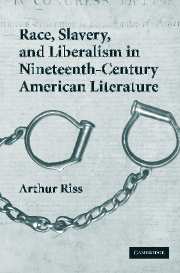Book contents
- Frontmatter
- Contents
- Acknowledgements
- Introduction: the figure a “person” makes: on the aesthetics of liberalism
- 1 Slaves and persons
- 2 Family values and racial essentialism in Uncle Tom's Cabin
- 3 Eva's hair and the sentiments of race
- 4 A is for Anything: US liberalism and the making of The Scarlet Letter
- 5 The art of discrimination: The Marble Faun, “Chiefly About War Matters,” and the aesthetics of anti-black racism
- 6 Freedom, ethics, and the necessity of persons: Frederick Douglass and the scene of resistance
- Notes
- Index
6 - Freedom, ethics, and the necessity of persons: Frederick Douglass and the scene of resistance
Published online by Cambridge University Press: 22 September 2009
- Frontmatter
- Contents
- Acknowledgements
- Introduction: the figure a “person” makes: on the aesthetics of liberalism
- 1 Slaves and persons
- 2 Family values and racial essentialism in Uncle Tom's Cabin
- 3 Eva's hair and the sentiments of race
- 4 A is for Anything: US liberalism and the making of The Scarlet Letter
- 5 The art of discrimination: The Marble Faun, “Chiefly About War Matters,” and the aesthetics of anti-black racism
- 6 Freedom, ethics, and the necessity of persons: Frederick Douglass and the scene of resistance
- Notes
- Index
Summary
This project has explored how an unexamined and anachronistic certainty about the “person” organizes the most influential modern readings of antebellum literary and political representation. It argues that the structure of liberal representation incites us to decontextualize the privileged referent of liberal discourse and to comprehend this conceptual category as a brute fact to be reflected rather than as the principal term that liberals construct and battle to define. One of the goals of this project, therefore, has been to challenge the prevailing assumption that invoking the transparent fact of the “person” is sufficient to oppose slavery. In particular, the “person” is insufficient to oppose slavery because what seems like a transparent fact to us (that slaves are “persons”) was not only far from transparent during the antebellum period, but also was precisely what was in dispute. Antebellum debates over slavery, in fact, most powerfully illustrate how the conceptual category of the “person” registers rather than resolves controversies, demonstrating how little claims about the self-evidence of the “person” ultimately accomplish when what is at stake is the question of “personhood.” Such an argument may strike some as ethically perilous and politically regressive.
The problem, however, remains that at different historical moments the conceptual category of the “person” has been invoked to legitimate acts of heinous violence as well as to justify crucial emancipatory movements, to authorize segregation as well to compel integration, to sanction as well as to proscribe hierarchies that we now consider invidious.
- Type
- Chapter
- Information
- Publisher: Cambridge University PressPrint publication year: 2006

